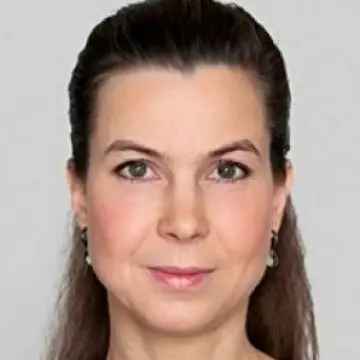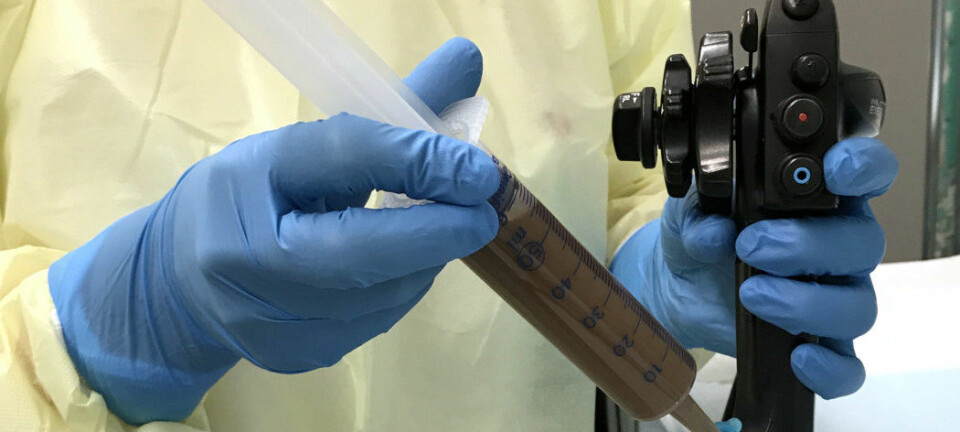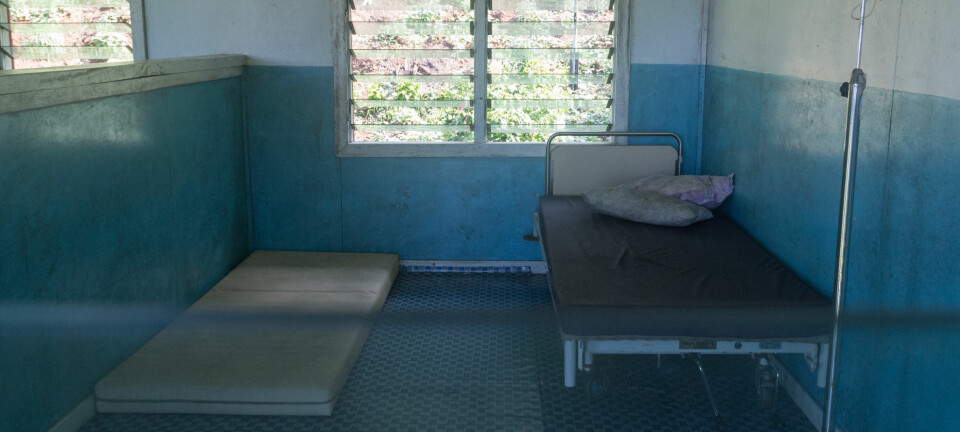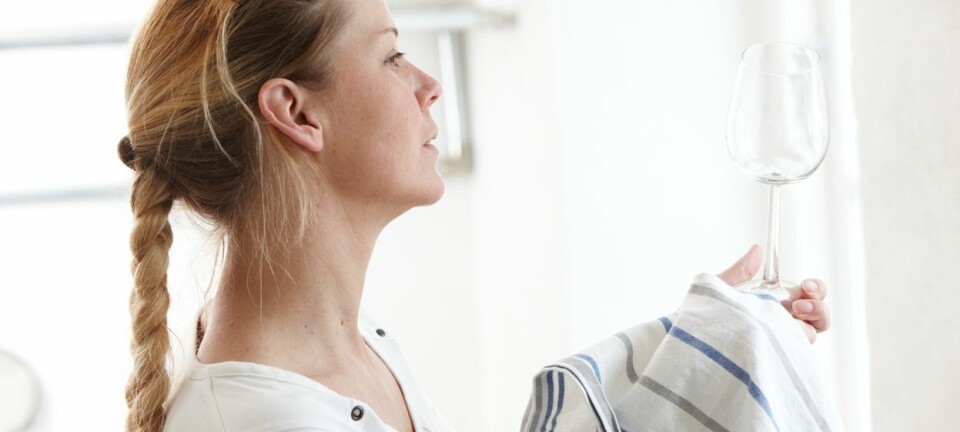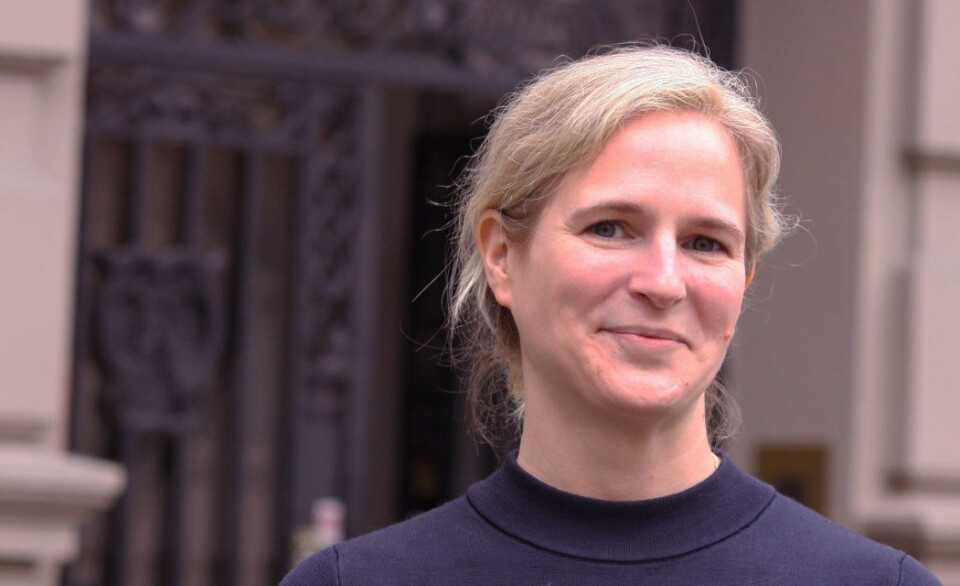
Bacteria lady: She’s terrified of bacteria – and their greatest champion
Jessica Lönn-Stensrud was holding her new-born daughter in her arms when she heard that three infants had died in an outbreak of antibiotic-resistant intestinal bacteria at a maternity ward in Sweden. Fear hit her like a punch to the stomach. Ten years later, she has become the micro-organisms’ noble defender.
“I kind of became the bacteria lady,” says Jessica Lönn-Stensrud.
She is one of the researchers in Norway who early on started to study bacteria's ability to talk to each another. Her interests naturally include microorganisms.
But this isn’t the reason for this article’s somewhat curious title.
The title has more to do with the fact that she is constantly out talking up the microorganisms that surround us. She talks about them on the radio, on TV and especially in her new book Vi må snakke om bakterier, dine viktigste venner - We have to talk about bacteria, your most important friends.
Lönn-Stensrud has quite simply become the noble defender of microorganisms.
But her journey didn't start that way. It started with fear.
It started with her new-born daughter in her arms, and the news that three infants had died in an outbreak of antibiotic-resistant gut bacteria at a maternity ward in Sweden.
Could go to hell
“The fear hit me like a punch in the gut,” says Lönn-Stensrud. “Antibiotic resistance is super scary.”
If the bacteria around us become resistant to antibiotics, people can start dying from small cuts and trivial infections. It could become impossible to carry out cancer treatment and vital surgery. And the babies in the maternity ward might no longer be safe.
“Everything could go to hell,” she says.
Under normal circumstances, you might think such a revelation would have inspired a fight against bacteria.
But not for Lönn-Stensrud.
Instead, she set out to defend the microorganisms. She wants to curb bacterial fears and the frantic use of hand sanitizers.
Has she gone crazy?
The war on bacteria
Lönn-Stensrud would argue that other people have been a little crazy for the last hundred years.
“People have a fear of bacteria and believe microorganisms are scary and nasty and should all be killed,” she says.
Ever since scientists first realized that microorganisms could make us sick, humanity has waged war on bacteria – by any and all means available, from chlorine to antibiotics.
The fight against bacteria has yielded some spectacular victories.
Hygiene and antibiotics have led to childbirth being an event that mothers and new-borns almost always survive. And pneumonia or deep wounds no longer mean you are in danger of dying. Modern weapons against bacteria have saved millions of lives.
But in recent years, something else has gradually become apparent. What at first seemed like a crushing victory over bacteria was probably just a small ripple on the battlefield.
Innocent victims
The bacteria are now learning how to overcome many of our weapons. Besides, something else has happened on the battlefield that we haven't seen before.
The same weapons that knocked out dangerous enemies also killed gazillions of innocent victims. They killed myriad bacteria and other microorganisms that live in and on our bodies and that do us no harm.
This may prove to be a major problem.
These little guys were our allies. They were probably protecting us without our knowing it.
Our first defence
“We’re finding more and more indications that when we have our bacteria around us, the dangerous bacteria pose less risk. Our bacteria are our first defence,” says Lönn-Stensrud.
Our bacterial partners colonize our skin, mucous membranes and intestines, leaving no room for potentially harmful newcomers. But what happens if we carpet bomb our old allies with bactericidal agents, while also changing the living environments in which they thrive?
When the ranks of allied bacteria are broken, the space is opened up to scarier variants that are lurking in the neighbourhood.
Paradoxically, the war on bacteria may end up forcing us to fight even more dangerous bacteria.
"I think we instead need to take care of the good bacteria so that we can save the antibiotics for those cases where we most need them," says Lönn-Stensrud.
Important for health
Many researchers believe that bacteria play an important role in our development, such as fine tuning our immune system.
This is not necessarily about training the immune system by having it combat lots of infections. Rather, encounters with a variety of bacteria should teach the body to distinguish between dangerous and harmless varieties.
We are seeing a clear increase in disorders involving the immune system – such as asthma, allergies and autoimmune diseases – in the period since we have been waging war on bacteria.
There are indications that dramatic changes in the bacterial communities in and around us may have played a role in these developments.
Numerous studies also suggest that our bacteria may play crucial roles for both mental and physical health.
Our modern society has changed the conditions for our small partners, according to Lönn-Stensrud.
Huge experiment
“We’re living in a giant experiment. We’ve evolved together with our bacteria for hundreds of thousands of years. But now everything is changing: surfaces, ventilation and food. These shifts are also changing the composition of bacteria that live in our local environment.
“Other bacteria are thriving in our environment today, and we have no idea what the consequences will be. We don’t know if important bacteria are disappearing,” says Lönn-Stensrud.
She believes that if we are to survive in this world, we have stop seeing ourselves in isolation, and rather begin to regard ourselves as an inseparable part of the world around us – including the world we can’t see with the naked eye.
“That's why I feel I have to talk about all the bacteria that aren’t dangerous, the ones that are probably very important to us,” she says. “We need to learn to be afraid of the right things.”
Simple solutions to complicated problems
Lönn-Stensrud also considers it a problem that we have been looking for simple connections in a world that is extremely complicated. This quickly leads to solutions that end in trouble.
“Before, we loaded ourselves with antibiotics. Now we're attempting to solve everything by loading up with probiotics. But it probably doesn't help much to tell people with depression to just eat a little kimchi,” she says.
We risk losing the whole picture when we try to pigeonhole bacteria into good vs. bad groups.
Skin bacteria that are usually harmless can for instance cause inflammation and trouble if they settle on implants.
“Think of the bacterium H. pylori,” says Lönn-Stensrud. “When we discovered that this microorganism was linked to ulcers and cancer, we wanted to kill it.
“But it turns out that H. pylori has evolved with us, and different types of it are more or less beneficial. Studies on Colombians show that if they have a variant derived from Africa this protects them more against cancer than if they have a variant derived from Europe."
The microbiologist thinks we have merely scratched the surface of the great connections between ourselves and bacteria.
Many unanswered questions
There are so many questions we should be asking, says Lönn-Stensrud.
“In agriculture, we saturate the fields with fertilizers and pesticides, which is probably changing the bacterial communities in the soil,” she says. “What does that mean for the plants and for us?”
We go shopping and buy organic tomatoes from the Netherlands. But they may harbour bacteria that we’re not familiar with. Is that good?
In our hospitals we have sealed buildings and modern ventilation systems. How does that affect the bacterial communities?
“Some experiments have shown that the number of bacterial species increases when we open the windows. But the number of dangerous bacteria decreases,” says.
Studies show that people with depression have fewer of certain types of bacteria in the gut. And that cancer medicine works better on people who have certain gut flora. But can we just transfer germs from someone else and think it will work?
“There’s no guarantee that my gut bacteria will work for you,” Lönn-Stensrud says.
Dare to admit we don't know
Lönn-Stensrud wants us to think about all this and ask the questions, even if it takes a while until we have good answers to them.
And then she wants researchers and health professionals to dare to admit that we don’t know.
Lönn-Stensrud is someone who knows a lot about bacteria. But she is constantly haunted by a feeling that has followed her since she was a child.
“I'm a tiny little person on a globe in infinite space. Out there is a huge world we know nothing about. We see small glimpses, but we really have no idea what they mean in the larger context.”
“I think we have to say to ourselves, ‘We don't know.’ We just have to keep being curious,” says Lönn-Stensrud.
———







